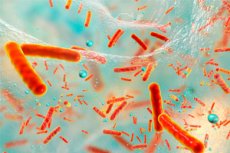First-in-class drug may prevent organ failure and death associated with sepsis
Sist anmeldt: 14.06.2024

Alt iLive-innhold blir gjennomgått med medisin eller faktisk kontrollert for å sikre så mye faktuell nøyaktighet som mulig.
Vi har strenge retningslinjer for innkjøp og kun kobling til anerkjente medieområder, akademiske forskningsinstitusjoner og, når det er mulig, medisinsk peer-evaluerte studier. Merk at tallene i parenteser ([1], [2], etc.) er klikkbare koblinger til disse studiene.
Hvis du føler at noe av innholdet vårt er unøyaktig, utdatert eller ellers tvilsomt, velg det og trykk Ctrl + Enter.

A new drug may prevent organ failure and death associated with sepsis by restoring the health of a patient's blood vessels.
Researchers from the University of Queensland and Queensland Children's Hospital have successfully tested a new class of drug in mice.
Dr Mark Coulthard, from the University of Queensland's paediatric intensive care unit and hospital, said preclinical results using human blood samples also looked promising.
The cause of organ failure in patients with sepsis is that the endothelial cells lining the blood vessels become permeable, leading to abnormal fluid shifts and eventually cutting off the blood supply.
We identified markers of vascular injury in children admitted to hospital with fever and suspected infection, and the protein signalling pathways associated with this in cells.
The drug we developed targets the interactions of these pathways to restore vascular endothelial cell function," said Dr Mark Coulthard.
Professor Trent Woodruff, from the University of Queensland's School of Biomedical Sciences, said the new approach addresses the root cause of organ failure, whereas previous unsuccessful attempts had largely focused on the immune response.
"Sepsis has been called a 'graveyard for pharmaceutical companies' because despite significant resources and more than 100 clinical trials, there is still no effective treatment that modifies the host response," said Professor Woodruff.
"A drug that targets the vascular endothelium could potentially could reduce the damage caused by sepsis, organ damage and death."
Dr Coulthard said the researchers were encouraged by the results of the preclinical trials.
"We tested our drug in blood samples from 91 children admitted to hospital with fever and suspected infection, and saw changes in biomarkers similar to those in our mouse studies," he said.
"This suggests that the drug may be effective in humans as well.
Further research is needed, including examining the drug in other animal models and its effectiveness in clinical trials."
The study was published in the journal Science Translational Medicine.
